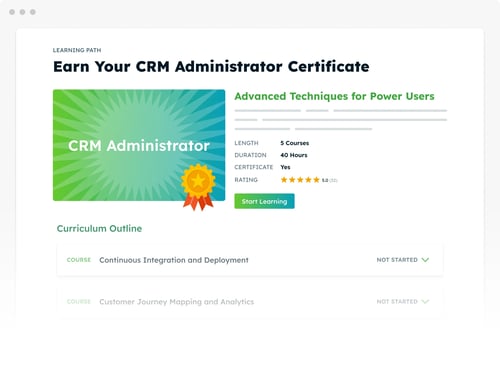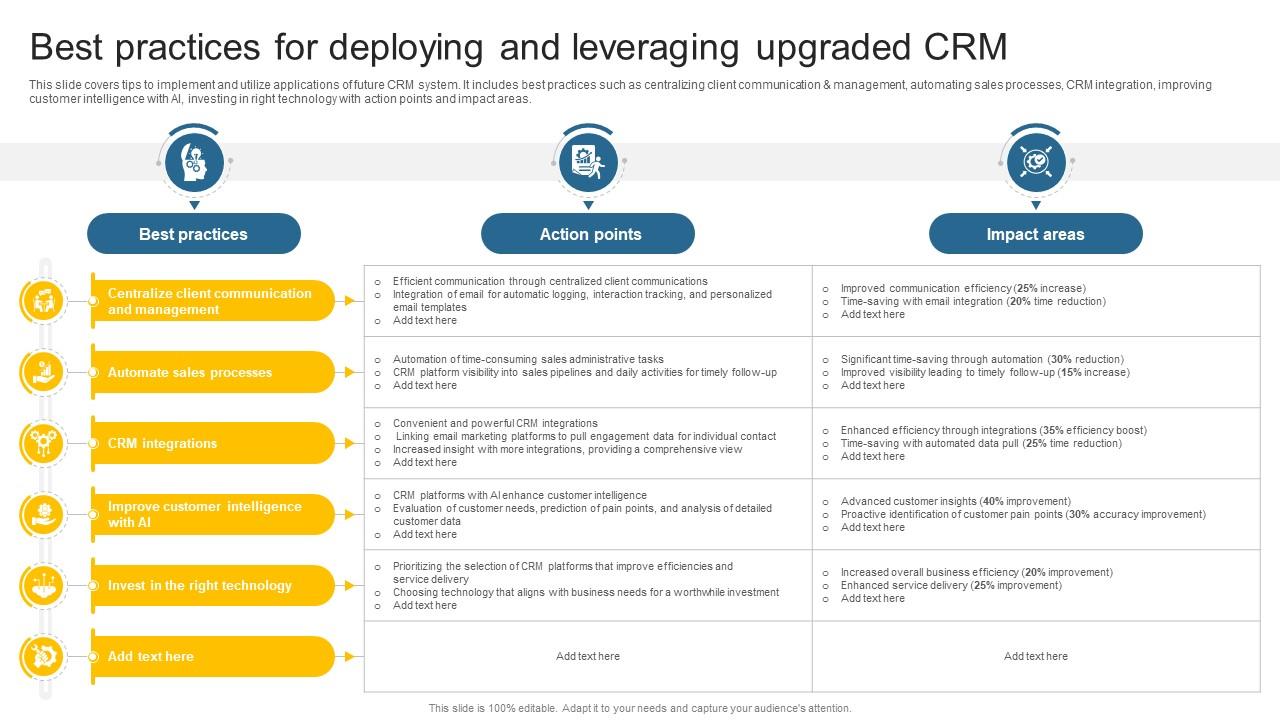Best practices for advanced CRM platforms include user-friendly interfaces and data security. These ensure efficiency and trust among users.
Customer Relationship Management (CRM) platforms play a crucial role in business success. They help manage customer interactions and streamline processes. Advanced CRM systems offer features like automated workflows and analytics. This boosts productivity and helps in making informed decisions. User-friendly interfaces ensure easy navigation for all team members.
Data security is critical to protect sensitive information. Regular updates and training sessions keep the team aligned with the latest features. Implementing these best practices ensures a smooth and effective CRM experience. Investing in a good CRM platform can lead to improved customer satisfaction and business growth.
Choosing The Right Crm
Choosing the right CRM can be challenging. It’s crucial to find a CRM that fits your business needs. This section will guide you through the process.
Key Features To Look For
When selecting a CRM, prioritize these key features:
- Ease of Use: The CRM should be user-friendly.
- Customization: Look for options to tailor the CRM to your needs.
- Integration: Ensure it integrates with your existing tools.
- Automation: Automation features save time and reduce errors.
- Reporting: Detailed reports help you make informed decisions.
Evaluating Vendor Options
Choosing the right vendor is crucial. Consider these points:
- Reputation: Research the vendor’s reputation.
- Support: Ensure they offer 24/7 customer support.
- Pricing: Compare prices to find the best value.
- Scalability: The CRM should grow with your business.
- Trial Period: A free trial helps you test the CRM before buying.

Credit: www.raklet.com
Data Management Strategies
Effective data management strategies are crucial for leveraging advanced CRM platforms. These strategies ensure data is integrated, accurate, and useful for decision-making. Below are key practices to follow for optimal data management.
Data Integration
Integrating data from various sources is essential. Use tools to combine data from different systems into your CRM. This creates a unified view of customer information, improving decision-making.
- APIs: Use APIs to connect different software systems.
- Data Warehousing: Store integrated data in a centralized data warehouse.
- ETL Processes: Extract, transform, and load data efficiently.
| Integration Tool | Function |
|---|---|
| Zapier | Automates workflows |
| Mulesoft | Connects enterprise applications |
| Informatica | Manages data integration |
Ensuring Data Accuracy
Accurate data is vital for effective CRM usage. Implement validation processes to ensure data is correct and up-to-date. Regularly clean your data to remove duplicates and outdated information.
- Data Validation: Check for errors during data entry.
- Data Cleaning: Regularly remove duplicates and outdated info.
- Data Governance: Establish rules and policies for data management.
Use tools and software to monitor data quality. This ensures your CRM data remains reliable and actionable.
Customization And Flexibility
Customization and flexibility are crucial for advanced CRM platforms. They allow businesses to tailor solutions to their specific needs. These features ensure that the CRM can grow alongside the business. This section explores how to make the most of customization and flexibility in CRM platforms.
Tailoring To Your Business Needs
Every business has unique requirements. An advanced CRM platform should adapt to these needs. Customization is key to making the CRM work for you. You can modify fields, forms, and workflows. This ensures that your CRM matches your processes.
Here are some ways to tailor your CRM:
- Create custom fields to capture specific data.
- Design personalized dashboards for different teams.
- Set up automated workflows to streamline tasks.
Scalability Considerations
As your business grows, your CRM should grow too. Scalability is essential in advanced CRM platforms. This allows the system to handle more data and users without slowing down.
Consider these factors for scalability:
- Ensure the CRM can integrate with other tools.
- Choose a platform that supports data migration.
- Look for cloud-based solutions for better scalability.
A scalable CRM ensures your business can expand seamlessly. It supports more users, data, and complexity.
| Feature | Benefit |
|---|---|
| Custom Fields | Capture specific data relevant to your business. |
| Automated Workflows | Streamline repetitive tasks and improve efficiency. |
| Cloud-based Solutions | Ensure better scalability and data accessibility. |
User Training And Adoption
To maximize the effectiveness of advanced CRM platforms, user training and adoption are critical. Proper training ensures users understand the system, leading to higher engagement and better use of CRM features. Below, we explore the best practices for user training and adoption.
Effective Training Programs
Effective training programs are essential for CRM success. Training should be comprehensive and easy to follow. Break down the content into manageable sections.
- Initial Training: Start with basic functionalities and navigation.
- Advanced Training: Gradually introduce complex features and workflows.
- Ongoing Training: Regular updates and refreshers to keep users updated.
Consider using different formats for training materials:
- Video tutorials for visual learners.
- Written guides for detailed instructions.
- Interactive sessions for hands-on practice.
Encouraging User Engagement
User engagement is crucial for CRM adoption. Make sure users feel comfortable and confident using the platform.
| Strategy | Action |
|---|---|
| Gamification | Introduce leaderboards and badges to reward active users. |
| Feedback | Regularly collect and act on user feedback. |
| Support | Provide accessible support channels for user queries. |
Encouraging a culture of continuous learning and support helps in maintaining high engagement levels.
Automation And Workflow
Automation and workflow are essential features of advanced CRM platforms. They help businesses save time, reduce errors, and increase efficiency. By automating routine tasks and streamlining workflows, companies can focus on growth and customer satisfaction.
Automating Routine Tasks
Automating routine tasks is one of the best practices for CRM platforms. It reduces the time spent on repetitive activities and increases productivity. Key tasks to automate include:
- Email Marketing: Schedule and send emails automatically.
- Data Entry: Automatically capture and input customer data.
- Follow-Up Reminders: Set automated reminders for follow-up actions.
Automation ensures consistency and accuracy in customer interactions. This leads to better customer experiences and higher satisfaction rates.
Streamlining Workflows
Streamlining workflows helps to optimize business processes. It ensures that tasks move smoothly from one stage to the next. Effective workflow management involves:
- Mapping Processes: Identify and document each step in the workflow.
- Setting Priorities: Determine the importance and sequence of tasks.
- Using Templates: Create reusable templates for common processes.
By streamlining workflows, businesses can minimize delays and bottlenecks. This results in faster turnaround times and improved efficiency.
Here is a simple table to illustrate the benefits of automation and workflow streamlining:
| Benefit | Description |
|---|---|
| Time Savings | Automated tasks reduce manual effort and save time. |
| Increased Accuracy | Automation minimizes human errors in data entry. |
| Enhanced Efficiency | Streamlined workflows ensure smooth task transitions. |
| Improved Customer Experience | Consistent interactions lead to higher satisfaction rates. |
Implementing these best practices can transform your CRM into a powerful tool. It will drive your business forward and keep your customers happy.
Analytics And Reporting
Advanced CRM platforms offer powerful analytics and reporting features. These tools help businesses to make data-driven decisions. Understanding how to utilize these features can optimize your CRM experience.
Utilizing Crm Analytics
CRM analytics provide insights into your customer interactions. This data helps to understand customer behavior and trends. Use these insights to improve your sales strategies and marketing efforts.
- Track customer interactions: See how customers engage with your brand.
- Identify trends: Understand what drives customer purchases.
- Improve sales strategies: Use data to optimize your sales approach.
CRM analytics can also help in segmenting your customers. This allows for more personalized marketing campaigns. Targeted marketing can increase customer satisfaction and loyalty.
Custom Report Generation
Custom reports allow you to tailor data to your needs. Create reports that focus on specific metrics. This helps in making informed decisions quickly.
| Report Type | Benefits |
|---|---|
| Sales Performance | Track sales targets and outcomes. |
| Customer Engagement | Measure customer interactions and satisfaction. |
| Marketing ROI | Evaluate the effectiveness of marketing campaigns. |
Generate reports on a regular basis. This keeps your data up-to-date and relevant. Regular reporting helps in identifying areas for improvement.
- Set report goals: Define what you want to achieve with your reports.
- Select relevant data: Choose data that aligns with your goals.
- Analyze the results: Review the report findings for actionable insights.
Using custom reports, you can make strategic business decisions. Tailoring reports to your business needs ensures you get the most relevant insights.
Customer Experience Enhancement
Customer Experience Enhancement is a crucial aspect of leveraging advanced CRM platforms. By focusing on personalized interactions and effective feedback and support, businesses can significantly boost customer satisfaction and loyalty.
Personalized Customer Interactions
Advanced CRM systems enable businesses to offer personalized customer interactions. This can be achieved by using data analytics and customer insights. Here’s how:
- Segmentation: Group customers based on behavior, preferences, or demographics.
- Customized Messages: Send tailored emails, messages, and offers.
- Predictive Analysis: Use past data to forecast customer needs.
Feedback And Support
Effective feedback and support mechanisms are vital for customer satisfaction. Advanced CRM platforms provide tools to streamline this process:
| Feature | Benefit |
|---|---|
| Live Chat | Immediate response to customer queries |
| Automated Surveys | Collect feedback efficiently |
| Help Desks | Centralized issue resolution |
Using these features, businesses can ensure quick responses and improved customer satisfaction. This leads to higher retention rates and positive reviews.

Credit: www.northpass.com
Security And Compliance
Security and compliance are crucial for advanced CRM platforms. Protecting customer data and following regulations is vital for trust and legal reasons. Let’s explore the best practices for ensuring security and compliance in CRM systems.
Data Security Measures
Data security measures are essential for protecting sensitive information. Implementing strong security protocols ensures customer data safety.
- Encryption: Use encryption to protect data at rest and in transit.
- Access Control: Limit access to data based on roles and responsibilities.
- Regular Audits: Conduct regular security audits to identify vulnerabilities.
- Multi-Factor Authentication (MFA): Add an extra layer of security with MFA.
- Data Backup: Regularly back up data to prevent loss in case of breaches.
Compliance With Regulations
Compliance with regulations ensures that your CRM platform adheres to legal standards. Following these standards helps avoid fines and build customer trust.
- GDPR Compliance: Ensure your CRM complies with the General Data Protection Regulation.
- HIPAA Compliance: For healthcare data, follow the Health Insurance Portability and Accountability Act.
- CCPA Compliance: Adhere to the California Consumer Privacy Act for customer data protection.
- PCI DSS Compliance: Follow the Payment Card Industry Data Security Standard for payment information.
Regularly updating your CRM to meet new regulations is important. Training employees on compliance practices ensures everyone follows the rules.

Credit: www.slideteam.net
Frequently Asked Questions
What Are The Key Features Of Advanced Crm Platforms?
Advanced CRM platforms offer automation, customization, and integration capabilities. They enhance customer management and streamline processes. Features include automated workflows, detailed analytics, and seamless integration with other tools.
How Does Crm Automation Improve Efficiency?
CRM automation reduces manual tasks and errors. It streamlines processes like lead tracking and follow-ups. This leads to increased efficiency and productivity for businesses.
Why Is Customization Important In Crm Platforms?
Customization allows businesses to tailor the CRM to their specific needs. It ensures that the platform aligns with unique workflows and goals. This leads to better user adoption and effectiveness.
How Do Advanced Crm Platforms Integrate With Other Tools?
Advanced CRMs integrate with various business tools like email, marketing automation, and social media. This provides a unified view of customer interactions. It enhances collaboration and data accuracy.
Conclusion
Advanced CRM platforms boost business efficiency and customer satisfaction. Follow best practices to fully leverage their capabilities. Keep data organized, automate tasks, and personalize customer interactions. Training your team ensures success. Embrace these strategies for maximum CRM benefits. Your business will thrive with a well-implemented CRM system.





